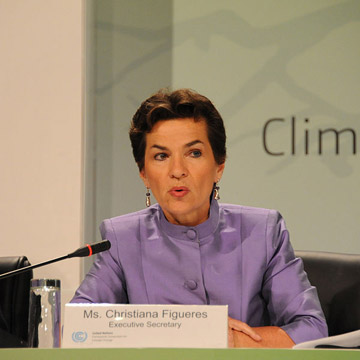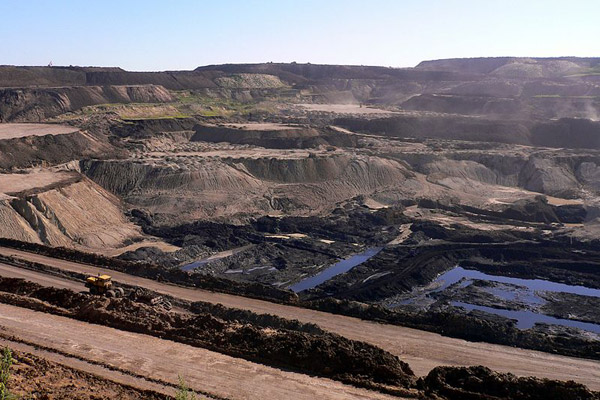Yesterday, at the International Coal and Climate Summit—just a couple miles from the ongoing UN Climate Summit—Christiana Figueres delivered a speech unlike anything ever heard at a coal industry meeting before. Figueres, the Executive Director of the UN Framework Convention on Climate Change (UNFCCC), took time off from wrangling world leaders and officials toward a climate agreement to talk tough to an industry currently worth around $3 trillion.
“Let me be clear from the outset that my joining you today is neither a tacit approval of coal use, nor a call for the immediate disappearance of coal,” Figueres told the summit. “But I am here to say that coal must change rapidly and dramatically for everyone’s sake.”
Even before Figueres’ speech, the International Coal and Climate Summit had attracted considerable controversy. Critics say Poland, whose government is a huge proponent of coal, purposefully planned the coal summit to occur simultaneously with the 19th Conference of the Parties (COP) to the UNFCCC in order to undercut progress at the Climate Summit.
“Hosting a coal and climate summit side-by-side is like throwing a cigarette expo next to a meeting of cancer experts,” noted Jamie Henn, Strategy Director for climate NGO 350.org earlier in the month.
Some also criticized Figureres, a Costa Rican native who has headed up climate negotiations since 2010, for even agreeing to speak at the coal summit.
Currently, Poland depends on coal for around 85-90 percent of its energy and has largely eschewed any efforts to move toward renewable energies. In addition, Poland has long been seen as obstructing EU efforts to raise ambitions to combat climate change, causing many to wonder why Poland was hosting this year’s UN Climate Summit in the first place.

Poland is home to Europe’s largest coal-fired power plant in Bełchatów. Photo by: Stasisław/Public Domain.
But if the International Coal and Climate Summit was meant to legitimize business-as-usual for the coal industry, Figueres’ speech poured cold water on that.
Figueres began by acknowledging the role of coal in the industrial revolution and in bringing cheap energy to millions, noting “coal has undoubtedly enabled much of our progress over the last 200 years.” But, she continued, the world now knew that coal came with “unacceptably high cost to human and environmental health.”
“The science is clear. The IPCC Fifth Assessment Report (AR5) outlines our predicament. We are at unprecedented [greenhouse gas] concentrations in the atmosphere; our carbon budget is half spent. If we continue to meet energy needs as we have in the past, we will overshoot the internationally agreed goal to limit warming to less than two degree Celsius,” Figueres said, noting that this was “not science fiction, it is science fact.”
She called the IPCC Fifth Assessment Report (or AR5) “arguably the most rigorous scientific report ever written,” saying the report has been “endorsed by 195 governments, including all of those in which you operate.”
Still, Figueres said the coal industry could play a role in a warming world, but only if they followed three “fundamental parameters”: shutter all subcritical coal plants; implement carbon capture and storage (CCS) at all new plants; and—the biggest of them all—leave most of the world’s remaining coal reserves untapped.
According to the AR5, if governments are to make good on their pledge of keeping temperatures from rising less than 2 degrees Celsius, most of the world’s remaining fossil fuel reserves will have to be left untouched. For the first time this year, the IPCC set a global carbon budget, which the world has already blown more than halfway through.
 Christiana Figueres in 2011. Photo by: Creative Commons 2.0. |
“These are not marginal or trivial changes, these are transformations that go to the core of the coal industry, and many will say it simply cannot be done,” she noted. “But the phrase ‘where there’s a will, there’s a way’ is tantamount to human history because will precedes innovation, and innovation precedes transformation.”
Figueres’ recommendations were backed by a statement from 27 climate and energy scientists, which countered the narrative put forward by the coal summit that simply improving efficiency at coal plants would be enough.
“Even the most fuel-efficient coal-fired power plants emit more than about 15 times the amount of CO2 […] compared to renewable energy systems and more than twice the amount of efficient gas-fired plants,” reads the document, which goes on to state that only coal plants fitted with carbon capture and storage could be considered “low carbon.”
However, once seen as a promising technology, the implementation of CCS has run into several issues, not least of which is the high costs of implementation. On the bright side, the climatologists write that coal energy is far easier to replace with alternatives than liquid fuels and many renewable energies—including onshore wind, biomass, hydropower, and geothermal—have become cost-competitive with fossil fuels.
To this end, Figueres also recommended that coal companies begin employing their vast financial resources beyond coal and start investing in renewable energies.
“By diversifying beyond coal, you reduce the risk of stranded assets and make yourselves ready to reap the rewards of a green economy,” she said.
She noted that these demands didn’t just stem from the scientific community and the UN, but increasingly global society.

Massive coal mine near Hailar in China. Photo by: Herry Lawford/Creative Commons 2.0.
“Students, faith-based organizations and citizens are asking their investment managers to divest from coal and other fossil fuels,” she said. “Cities choked by air pollution are limiting the burning of coal. Development banks have stopped funding unabated coal. Commercial financial institutions are analyzing the implications of unburnable carbon for their investment strategies. Pricing of [greenhouse gas] emissions is on the rise, evidenced by trading markets coming online around the globe. And, international policy is moving us toward a global low-emission economy.”
Given this, she said the global coal industry must “honestly assess the financial risks of business as usual.”
Coal currently represents around 41 percent of global energy production and, if trends continue, is expected to overtake oil as the world’s biggest energy source. However, possible signs of decline have begun to crop up. In the U.S. coal plants are closing against a glut of natural gas, new regulations, and renewable energy installations. The World Bank, the European Investment Bank, the U.S., and most Scandinavian countries have cut off new funding for coal plants abroad expect in rare circumstances. Perhaps, most importantly, China—which consumes almost half the world’s coal produced—has said its coal consumption will peak in 2015 and has begun announcing a slew of new environmental programs and regulations to deal not only with their carbon emissions, but record air pollution.
Meanwhile, new coal plants are coming up against a more educated and alarmed citizenry. For example, plans to build a coal plant in Bangladesh’s Sundarbans—the world’s largest mangrove forest—led to a five day march that attracted some 20,000 people. In Malaysian Borneo, a protracted civilian campaign led to the cancellation of a coal plant that would have sat on a beach between one the island’s last primary rainforests and healthy coral reefs.
“I urge every coal company to honestly assess the financial risks of business as usual; anticipate increasing regulation, growing finance restrictions and diminishing public acceptance; and leverage technology to reduce emissions across the entire coal value chain,” Figueres said.
She called on the coal industry to take “steps that look past next quarter’s bottom line and see next generation’s bottom line,” adding, “For it will be your children and my children, our grandchildren and their grandchildren who will look back at today and judge our collective commitment to them.”

The chart shows the cost of coal in Australia, one of the world largest producers and consumers of coal. As coal and other fossil fuel prices are rising, renewable costs are decreasing. In some conditions, renewable energies are actually cheaper than fossil fuels.
Related articles
Carbon emissions set to hit new record high in 2013

(11/19/2013) The amount of carbon dioxide emitted into the atmosphere in 2013 is expected to hit a new high of 36 billion tonnes, according to a Carbon Budget released today by the Global Carbon Project (GCP). This is a 2.1 percent rise from 2012 based on data from the same group. ‘We have exhausted about 70 per cent of the cumulative emissions that keep global climate change likely below two degrees,’ said GCP member, Pierre Friedlingstein, with the University of Exeter. ‘In terms of CO2 emissions, we are following the highest climate change scenario of the Intergovernmental Panel on Climate Change released in September.’
World’s most vulnerable nation to climate change turns to coal power

(11/18/2013) In October, a global risks analysis company, Maplecroft, named Bangladesh the world’s most vulnerable nation to climate change by 2050. The designation came as little surprise, since Bangladesh’s government and experts have been warning for years of climatic impacts, including rising sea levels, extreme weather, and millions of refugees. However, despite these very public warnings, in recent years the same government has made a sudden turn toward coal power—the most carbon intensive fuel source—with a master plan of installing 15,000 megawatts (MW) of coal energy by 2030, which could potentially increase the country’s current carbon dioxide emissions by 160 percent.
60,000 protest in Australia to keep carbon price
(11/18/2013) Around 60,000 Australians marched yesterday across the country calling on their government not to go backwards on climate action, according to organizers. Australia has taken a sudden U-turn on climate policy with the election of Prime Minister Tony Abbott in September, including legislation to end its carbon pricing, cutting funding to renewable energies, and obstructing progress at the ongoing UN Climate Summit in Warsaw.
Japan pledges to raise carbon emissions, instead of cutting them
(11/18/2013) In 2009, Japan pledged to cut its carbon emissions by 25 percent based on 1990 levels within 11 years. Four years later—including a nuclear meltdown at Fukushima—and Japan has reset its goal with a new target to cut emissions by 3.8 percent based on 2005 levels at the UN Climate Summit in Warsaw, Poland. But, the new target, which received widespread condemnation when announced on Friday, actually results in a 3.1 percent rise in emissions when viewed from the widely-accepted 1990 baseline.
Is Australia becoming the new Canada in terms of climate inaction?
(11/14/2013) For many concerned about climate change, Australia has suddenly become the new Canada. With the election of Tony Abbott as Prime Minister in September, the land down under has taken a sudden U-turn on climate policy, including pushing to end its fledgling carbon emissions program which was only implemented in 2012 and cutting funding for renewable energy. These move come at a time when Australia has just undergone its warmest 12 months on record and suffered from record bushfires.
(11/13/2013) In 2011, the top 11 richest carbon emitters spent an estimated $74 billion on fossil fuel subsidies, or seven times the amount spent on fast-track climate financing to developing nations, according to a recent report by the Overseas Development Institute. Worldwide, nations spent over half a trillion dollars on fossil fuel subsidies in 2011 according to the International Energy Agency (IEA).
Philippines’ delegate calls out climate change deniers after Haiyan
(11/12/2013) Yesterday, the Filipino delegate to the ongoing climate summit, Naderev ‘Yeb’ Saño, dared climate change deniers to take a hard look at what’s happening not just in the Philippines, but the whole world. Over the weekend, the Philippines was hit by what may have been the largest typhoon to ever make landfall—Typhoon Haiyan. Reports are still coming in days later, but the death toll may rise to over 10,000 with whole cities simply swept away.
Delegate for the Philippines vows to stop eating at climate summit

(11/11/2013) Following the devastation wrought by Typhoon Haiyan—which is arguably the strongest typhoon to ever make landfall—Filipino delegate, Naderev ‘Yeb’ Saño, has vowed to go on a fast at the UN Climate Summit that opened today in Warsaw, Poland. Saño made the vow during a powerful speech in which he said he would fast, ‘until we stop this madness.’
Bangladesh plans massive coal plant in world’s biggest mangrove forest

(11/11/2013) On October 22nd Bangladeshi and Indian officials were supposed to hold a ceremony laying the foundation stone for the Rampal power plant, a massive new coal-fired plant that will sit on the edge of the Sundarbans, the world’s largest mangrove forest. However, the governments suddenly cancelled the ceremony, instead announcing that the project had already been inaugurated in early October by the countries’ heads of state via a less-ornate Skype call. While the governments say the change was made because of busy schedules, activists contend the sudden scuttling of the ceremony was more likely due to rising pressure against the coal plant, including a five-day march in September that attracted thousands.
Bay Area pledges to slash greenhouse gas emissions by 80 percent by 2050
(11/11/2013) While many of the world’s national governments move tepidly (if at all) to combat climate change, cities are showing increasing leadership. The San Francisco Bay Area’s Air District Board signed off last week on a measure to cut greenhouse gas emissions by 80 percent within less than 40 years time as based on 1990 levels. The measure follows the same goal as an executive order made by California governor, Arnold Schwarzenegger, in 2005.







